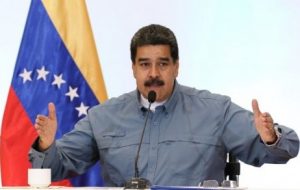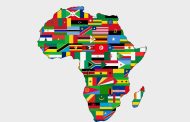By Dr. Yusuf Bangura
I have been following debates on the economic dimensions of the Ukraine crisis on France 24 since the Russian invasion of that country. France 24 does a good job of bringing a variety of experts on their panels. Today’s issue is the impact of an oil embargo on Western economies.
Biden has announced that the US, which is dependent on Russian oil for 5% and gas 3% of its imports, will ban oil and gas imports from Russia. The UK and EU, which have higher levels of dependency on Russian oil and gas, agreed to phase out or drastically reduce their imports by the end of the year.

President Nicolas Maduro of Venezuela: enemy yesterday, friend today?
Taking Russian oil and gas out of European and US markets will obviously further raise the price of the two commodities beyond their current high levels. It has been predicted that the price of oil could rise to USD200 or even USD300 a barrel.
Turning Russia’s oil tap off requires a quick search for alternatives if US and European consumers are to be protected from the shock.
And this is what I find interesting. The US has decided to open talks with……guess who? (1) The US bogeyman, President Nicholas Maduro, who the US wanted to topple not long ago for turning Venezuela into an authoritarian state, and which is under US sanctions. And (2) the mullahs of Iran who are also under stiff sanctions over disagreements on nuclear weapons development.
US officials have already met with Maduro and his government and Maduro, in a press conference, is making a meal of it, describing the realignment of US-Venezuela interests as a ‘beautiful unity’. And Biden’s press secretary, Jennifer Psaki, confirmed a day ago that the US is in discussion with Iran on its nuclear programme and oil supplies.
The US must have calculated that it cannot have too many enemies if it is fighting Russia—that in the grand scheme of things, Russia is a bigger threat to US interests than Venezuela and Iran.
Venezuelan ‘pro-democracy’ advocates who have placed their trust in the US to get rid of Maduro will be left high and dry. This underscores the point that it is always dangerous to put one’s eggs in a super power’s/big power’s basket.
The Ukraine crisis signals the end of US/Western triumphalism and belief that they can bully any country they dislike following the collapse of the Soviet Union and emergence of a unipolar world. We are back to *realpolitik*, with the US having to choose global enemies strategically and throwing its pretentious mission of promoting democracy on the world stage out the window.
These developments confirm one of the first things I learned 50 years ago in my undergraduate strategic studies class at the LSE on power and interests: countries only have permanent interests, not permanent friends, and ideology counts for little in international politics. If only African leaders can also think strategically and leave emotions and personal gain out of policy making.




























